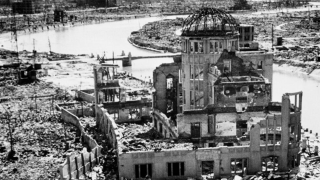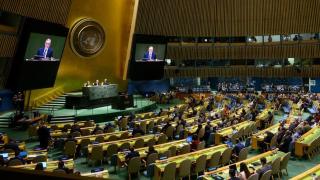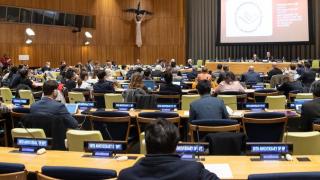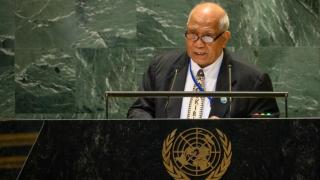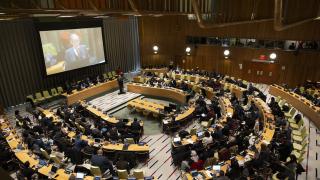
On Friday 27 August, after four weeks of discussion, the Review Conference of the Nuclear Non-Proliferation Treaty (NPT) - which had been repeatedly delayed since 2020 - ended with the failure to agree on an outcome document. Intense negotiations ended late in the day, after Russia objected to language relating to control over the Zaporizhzhia nuclear power plant in Ukraine.
The NPT is widely considered the cornerstone of international efforts on nuclear non-proliferation and disarmament. The outcome document would have committed the NPT’s 191 states parties to a set of actions to make progress towards the Treaty’s implementation.
Undoubtedly, Russia’s invasion of Ukraine - a nuclear weapons state waging an illegal war of aggression against a non-nuclear weapons state - compounded by its reckless occupation of Ukrainian nuclear power plants, its threats to use nuclear weapons and its claimed raising of its weapons to high alert, has dealt a heavy blow to the NPT. But it is not the only issue putting the NPT under strain.
In theory, parties to the NPT meet every five years to adopt a plan of action. This year’s failure compounds the inconclusive 2015 meeting making 2010 the last time agreement was reached. Throughout this period, the failure of nuclear armed states to uphold their side of the bargain at the heart of the NPT - to pursue negotiations in good faith towards disarmament - has loomed large with a majority of states at the UN demanding concrete action on nuclear disarmament. In an attempt to make progress, a series of international meetings ensued, culminating in 122 countries supporting the adoption of the UN Treaty on the Prohibition of Nuclear Weapons (TPNW) in 2017.
Throughout this period, nuclear-armed states have been at odds with their NPT obligations. Not only did they repeatedly boycott international meetings on disarmament, but by 2015 they had implemented just five of the 22 disarmament-related action points of the 2010 action plan. All five recognised nuclear-armed states - Britain, China, France, Russia, US - are in the process of modernising and expanding their arsenals.
UNA-UK acknowledges certain positive steps that the UK has taken, including advocacy for a Fissile Material Cut-Off Treaty, the entry into force of the Comprehensive Nuclear Test Ban Treaty (CTBT) and various diplomatic efforts on verification and the peaceful uses of nuclear energy. We also recognise the outreach the UK has done with civil society in the past, although we note with concern more recent signs that the UK is taking a more hostile approach to civil society on this issue, as UNA-UK Head of Campaigns Ben Donaldson pointed out in this blog.
Fundamentally, the UK is not disarming; it is rearming. This is incompatible with its international obligations and part of a pattern that was clear long before Russia’s 2022 invasion of Ukraine took the international community by surprise. The Government’s 2021 Integrated Review announced a rollback of transparency and trust-building measures as well as an increase in the upper limit of the UK’s warhead stockpile, leading the UN Secretary-General to take the rare step of publicly criticising the UK for its actions “contrary to its obligations under Article VI of the NPT”.
UNA-UK is concerned that the UK’s actions have undermined the credibility of the NPT. The UK’s combative stance towards the TPNW and its repeated failure to attend conferences looking into the humanitarian and environmental consequences of nuclear weapons has deepened divisions between the international community working on nuclear issues.
While this summer’s NPT did not achieve an outcome document, the TPNW did - the Vienna Action Plan. This plan includes an opportunity of particular relevance to the UK: the establishment of a programme of work to address the harms caused by past nuclear testing. As a country that has tested nuclear weapons resulting in adverse impacts on local populations, the UK has a special responsibility to offer information and expertise to aid those affected by nuclear testing, including Kiribati - a country affected by the UK’s nuclear testing programme.
Click here to read UNA-UK and Article 36’s joint report on UK nuclear testing in Kiribati
Click here for UNA-UK’s work on Ukraine
Photo: Tenth Review Conference of Parties to Treaty on Non-Proliferation of Nuclear Weapons.
Credit: UN Photo/Manuel Elías

